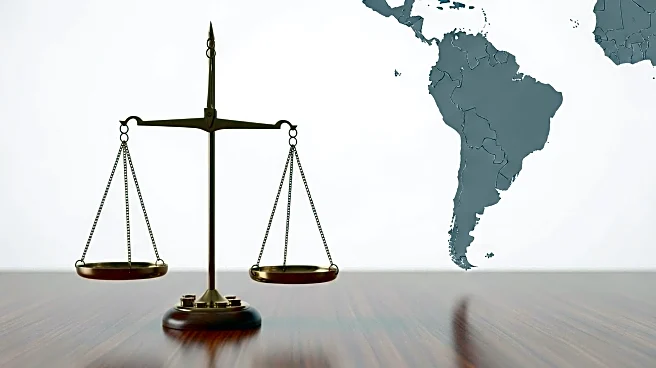What's Happening?
The Supreme Court has granted President Trump the authority to continue deporting Venezuelan migrants who were previously protected due to unsafe conditions in their home country. On October 3, the court paused a federal judge's ruling from September that had challenged the administration's decision to terminate the Temporary Protected Status (TPS) program for Venezuelans. This program had allowed hundreds of thousands of Venezuelan migrants to live and work temporarily in the United States. The court's decision follows a similar ruling in May, where it lifted a temporary order from a California federal judge that had kept the program in place. The court's three liberal justices dissented, with Justice Ketanji Brown Jackson criticizing the decision as a misuse of the emergency docket. The Justice Department argued that lower courts were disregarding the Supreme Court's previous interventions, calling their actions indefensible.
Why It's Important?
The Supreme Court's decision has significant implications for Venezuelan migrants in the U.S., as it potentially exposes them to deportation and separation from their families. The ruling affects thousands of individuals who have been living and working in the U.S. under the TPS program, which was designed to protect migrants from countries experiencing dangerous conditions. The decision also highlights the ongoing legal battles over immigration policies under President Trump's administration, which have been marked by ideological divisions within the courts. The administration's stance is that the TPS program burdens local governments and that some Venezuelans are linked to criminal organizations. This ruling could lead to increased deportations and further strain on migrant communities, as well as impact U.S.-Venezuela relations.
What's Next?
The legal process is expected to continue as advocacy groups and affected Venezuelans challenge the administration's actions. The National TPS Alliance and individual Venezuelans have argued that returning to Venezuela is unsafe, and they plan to pursue further legal avenues to protect their status. The appeals process may provide additional evidence for consideration, including claims that the Department of Homeland Security acted hastily and without proper procedures. The Supreme Court's decision may prompt further legislative or executive actions regarding immigration policy, as stakeholders assess the impact on migrant communities and local governments.
Beyond the Headlines
The decision raises ethical and humanitarian concerns about the treatment of migrants and the role of the judiciary in immigration policy. It underscores the tension between executive authority and judicial oversight, as well as the broader debate over the U.S.'s responsibility to protect vulnerable populations. The ruling may also influence public opinion and political discourse on immigration, potentially affecting future policy decisions and electoral outcomes.










